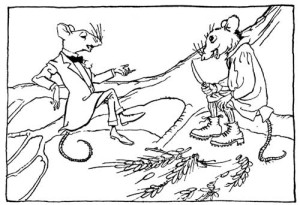
Fired, Fired!?!
To this day, I’ve never worked with anyone like Bruce Kirle. He wasn’t a bad player at all, but the baggage that came with him was far beyond any talent that he could have possibly had at his prime, if he had a prime at all.
The claim that he came with to the gig was that he was a renowned pianist on the Broadway circuit in NY. The problem is that nobody ever heard of this guy – at least none of the people who I knew from that spectrum. No matter, he was proficient at the piano, knew the music, could play it by ear if things went wrong on stage, and was proficient at getting the singers on stage sounding good. What more could you ask for, indeed! I do believe that he was from NY. Having grown up in Brooklyn, I recognize a New-Yorker from a mile away – check! The question was, why was he in Florida while still in his mid 40s? After working with him on a few different productions, I think I started figuring it out. Not really, I figured it out pretty much inside of a week – okay, the first rehearsal. Nobody I know in NY would put up with his crazy shit!
This was all back in the 1980s. I was young, money was tight, and I’m pretty sure that my prefrontal lobe hadn’t quite matured enough to regulate my impulse control adequately. Come to think of it, that goes for all musicians. Bruce was the picture of an angry New York musician: First of all, he was haggard and thin; he chain-smoked like nobody I’ve ever seen; he was a poster-child for NY Jew – not in a bad way, but he wore his eastern European genealogy with a vengeance – dark, thick, tight hair; eyes as big and black as night with the bags to go with it; he had no regard for his health, whatsoever – GOD, the things I saw him eat; he had the telltale attitude of a downtrodden, angry curmudgeon. What more could a bunch of snotty, mischievous, young musicians ask for? It was as irresistible as a rotting carrion to vultures. We could smell this one from a mile away – except that he smelled of stale cigarettes instead of death.
Bruce would show up every night in the pit wearing a tuxedo. You might say that this isn’t too unusual for a person playing a Broadway show – except for the fact that the audience couldn’t see the musicians and never saw the musicians at any time during or after the performance. He had a few odd eccentricities when he played piano. He had a tendency to lift his hands a little too high off of the keyboard when he played, sort of showy, but disturbingly overdone. Grunting, there was lots of grunting and always a very surprised look on his face when he played. He also had no tolerance for mistakes in the music – unless he made them – because he was perfect and flawless. Did I mention that he didn’t like you if you disagreed with him – EVER? It didn’t matter how large or small the disagreement was. There was one other thing that was intriguing about Bruce; he seemed to be infinitely gullible, which was pretty odd for a megalomanic. In the world of childish musicians, gullible is like gold, and we were the starving masses.
One of the first things that started to bother us right away was that Bruce didn’t think that the Fire Marshall’s rule, “No smoking during any part of the performance,” didn’t apply to him. I mean, why would it? The musicians were in a heavily padded loft above the stage with only one egress, well two, but the 2nd exit was blocked and opened to the outdoors, 30-feet off the hard, hard ground. Bruce constantly had a cigarette in his mouth and he tossed them on the ground underneath his piano bench when he was done. He would make the motion of stomping it out, but I think that this was just a habit because he rarely actually stepped on the butt, so it sat under his bench and smoldered. After a few days, Ken, the drummer, who sat behind Bruce, kept a loaded water pistol with him to make sure that if the pile of butts ever caught fire, he would be able to put it out, or at least have a fighting chance. Now for us, having a water pistol in the pit wasn’t really that big of a surprise, we had them all the time, but we were also trying to behave for the new music director in town. You know, just in case all of his bragging was actually true? Oddly enough, it became quite a regular thing that Ken, the drummer, would put out small fires under Bruce during shows. I was happy knowing that Ken was on the gig. Good drummers have always amazed me with their abilities. I mean, they can keep a beat going, follow the pratfalls on stage, play horns and bells and whistles out of time to match stage movements, and all while putting out a fire with a dime store water pistol. We, as musicians, make fun of drummers, but they do some extraordinary stuff that has nothing to do with music, while playing music.
The first show that any of us guys in Florida played with Bruce was, “Singin’ in the Rain.” Most of us had played that show at one time or another, so it was really a routine gig, or so we thought. At the first rehearsal, it came to my attention that the book had been enhanced with many, many sloppy, taped inserts and scribbly annotations. I don’t want to brag, but to make a point here, I was known as the guy who could, “read fly shit.” I saw this book and often had no idea what the notation meant or what the scribbles said. I had seen lots and lots of altered show books, but this was something unique. What also stood out was that when you said that you didn’t understand something he wrote, he would just get pissed and started complaining about how stupid Florida musicians were. Okay, if you say so. On one tune, he just told us to transpose it to another key. “What, you can’t do that?” Ahem, I noticed that you had it all written out nicely for yourself – What, you can’t just do that? Dickhead! Yeah, I was a jazz guy, but didn’t just transpose arbitrary stuff on a regular basis. And, did he ever consider that we might have to sub out this (shitty, low paying) gig once in a while? Obviously, something had to be done. The pit musicians had a meeting. Not really, we met on the breaks and complained a lot, but you could read the writing on the wall. This called for childish civil disobedience!
We tried the cutesie stuff that worked on other conductors. Ken, the drummer, always had toys in his drummer bag. We tried the whoopie cushion. He popped it – on purpose! Obviously, he did not want to be laughed at…challenge accepted! Things were quiet for a while after the whoopie cushion incident. There was a tension in the air. What were we to do with this guy? Was he that serious? Was he a joke savant? Had we met our match? One event cemented his fate.
Early in the run, there was an incident during the show. There was a break between tunes, as there always is in a musical show. Most of the time, especially at the beginning of the run of a show, we would all prepare for the next number as the breaks in the music are usually short. Ken was shuffling his sticks around to prepare for the next number. There were many stage queues on this tune, so he had to get his bump and zingee noisemakers ready. He was also, being a typical percussion-type person, auditioning new equipment. This time he was trying out new snare drums. On his kit, he had the new drum in the normal position – right in front of the drum stool. The other drum was on the floor next to the hi-hat. As he was preparing his noisemakers for the next number, he gently laid his sticks on the snare as most drummers do. The lugs on the drum keep the sticks from rolling off, but this was a different drum. He put the sticks down and turned around. They rolled off the snare and onto the snare on the floor, which was, as I call, still “loaded,” meaning that the snare was still engaged. The sticks (I could see it all happening from my vantage point) went, butt first, onto the snare on the floor with about one-half second between them. You could instantly see that Ken was very upset about this – good drummers are noisy, but only when they’re supposed to be. There’s a pride thing is being able to be as annoyingly quiet as they are noisy. Bruce, on the other hand, assumed that this was more shenanigans, and told Ken, quite loudly – during the middle of the show, that if he didn’t stop screwing around that he was fired. After the show, Ken tried to explain to Bruce what had happened. Bruce’s reaction was childishly petulant and, I might add, a bit profane. He told Ken that if he didn’t like it that he could, “Fuck off right now. You’re fired!” In the pit, that we were working, there was a small dressing room behind where we put our instrument cases and stuff and sometimes we’d hang out there on long breaks in the music. Ken and Bruce were the only ones in the pit, the rest of us were in the dressing room listening. After all, this was some good stuff. I was the first one out of the dressing room, to watch the “show after the show.” Just as Bruce said the comment, he proceeded to push Ken in the chest. I immediately knew what was coming next. Ken was a sweet guy, probably one of the nicest people I’ve ever worked with, but he was no pushover either. Ken grabbed Bruce by the throat and slammed him up against the wall; then dragged him over about a foot to the opening in the pit. Yes, he was going out of the pit, but there was also a good 25-foot drop down to the stage. It took three of us to keep Bruce from going over! He really was off the ground and going over when I grabbed his legs. Ken kept his job and this was never spoken about again, but Bruce seemed to have a new found “soft spot” in his heart for Ken’s antics. Believe me, we took advantage of that!
Although, after working with Bruce for a few years, I ponder why I grabbed his legs in the first place. I think it’s because I didn’t want to stop working with Ken more than it was to save Bruce from certain spinal injury or death. There were much better piano/conductors in the area that would have been more fun to work with. Even “The Dark Queen” would have been more fun to work with. He’s an entirely different post, though. You’ll have to stay tuned.
 When I was attending the University of North Texas, I was dating a person, who, incidentally, is now my wife. She was an opera Master’s student at the time and there was to be a master class by a famous soprano from the Met. Being the good boyfriend, I went with her to watch the master class. Honestly, at the time, I was taking [as my elective in my Master’s in jazz performance degree] choral conducting – to broaden my knowledge, so the master class was academically relevant, but not exactly what I would choose to do in my spare time.
When I was attending the University of North Texas, I was dating a person, who, incidentally, is now my wife. She was an opera Master’s student at the time and there was to be a master class by a famous soprano from the Met. Being the good boyfriend, I went with her to watch the master class. Honestly, at the time, I was taking [as my elective in my Master’s in jazz performance degree] choral conducting – to broaden my knowledge, so the master class was academically relevant, but not exactly what I would choose to do in my spare time.

